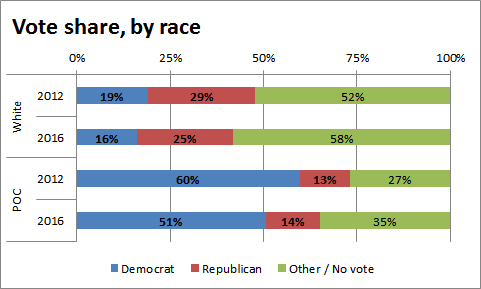Michael Kruse writes in Politico that Trump voters have high expectations.
“I think you’ll start seeing improvements in six months,” Bill Polacek said in his corner office at JWF Industries, where he’s one of the owners of one of Johnstown’s last manufacturing plants.
Dave Kirsch stood in the parking lot of Himmel’s Coal Yard in Carrolltown, where he drives a truck, and expressed optimism and preached patience–not, though, that much patience. “My boss, he’s a pretty smart man,” Kirsch told me, “and he said it can’t change overnight, but he said give it six months to a year.”
Maggie Frear, a retired nurse, told me toward the end of our meeting one evening in her home that the changes Trump pledged would “take him at least a couple months.”
Now, you and I know that Trump ain’t gonna do squat for these people in six months to a year. Or two years. Or four years. Or twenty years. You know that by the cabinet he’s putting together. The signals so far are that he’s going to give Republicans a free hand to carry out their most regressive agenda, including gutting Medicare and Social Security.
Even Trump’s infrastructure plan is a scam, according to Bernie Sanders:
“During the presidential campaign, Donald Trump correctly talked about rebuilding our country’s infrastructure,” Sanders said. “But the plan he offered is a scam that gives massive tax breaks to large companies and billionaires on Wall Street who are already doing phenomenally well. Trump would allow corporations that have stashed their profits overseas to pay just a fraction of what the companies owe in federal taxes. And then he would allow the companies to “invest” in infrastructure projects in exchange for even more tax breaks.”
It was Sanders’ strongest rebuke of Trump’s plan, which incentivizes companies to invest in infrastructure projects through tax breaks rather than direct spending. He has proposed an approximately $1 trillion plan to invest in rebuilding the nation’s roads, bridges, and other infrastructure, though it has seen backlash from both sides of the aisle.
“Trump’s plan is corporate welfare coming and going,” Sanders wrote.
(Even if they got a tax break, why would companies invest in public infrastructure, anyway? Why would they spend money on projects that don’t benefit them exclusively, or that will never give them a profit? That makes no sense to me.)
Kruse writes that those Trump voters will turn on Trump if he doesn’t deliver. And he’s not going to deliver. Indeed, if you go back and take apart Trump’s campaign rhetoric, it doesn’t add up to much but slogans. People heard what they wanted to hear.
But the value in reading the Politico piece is that it does give a sense of how these voters in Pennsylvania saw the election, and themselves. They’ve been ignored for a long time. The system doesn’t work for them. Their communities are deteriorating; their sons are being lost to drugs. Clinton-style Democrats offered nothing but platitudes for decades. Trump became the object of their hopes.
Charles Pierce said, “Explain to me how what’s being described here is not people indulging an addiction to the political opioids.” He also said:
And we finally come to the nub of it. In the campaign just passed, racism and xenophobia and sexism were not “the only reasons” Trump won. That’s stupid. There is genuine economic anxiety and despair in the country. But they were the accelerant. They might not have been the biggest reason why he won, but they damn sure were a big part of filling his rally halls and getting his voters to the polls, and not just in the South, either. All American populism falls into the trap of scapegoating The Other eventually; if it didn’t, Bernie Sanders would be picking his Cabinet right now.
This is something I keep trying to emphasize. Some portion of Trump supporters are flat-out white supremacists, sure. But a lot of them are people who would be much less racist now had their culturally induced racism not been fed and nurtured for years by scapegoating.
“For most U.S. workers, real wages — that is, after inflation is taken into account — have been flat or even falling for decades, regardless of whether the economy has been adding or subtracting jobs,” Pew says. Real wages peaked in January 1973 and have been falling ever since. That was the beginning of the end, and it happened shortly after the the point at which affirmative action was finally being enforced. I graduated college in 1973, and as I remember mine was the first graduating class that was really impacted by it. I have no reason to think that affirmative action caused real wages to decline — there were a whole lot of other causes for that — but it was what people saw.
Throughout the 1970s and 1980s it was common for people to scapegoat affirmative action for their deteriorating economic conditions. Now they’re scapegoating immigrants. Politicians and right-wing bobbleheads openly have encouraged this. It’s easier than explaining the real reasons.
But the deteriorating economic conditions were what opened the door to the scapegoating. And we are dealing with long-range deterioration; most of the workforce today doesn’t remember the good old days, but they heard about them from Dad. Or Grandpa. It makes me crazy when someone points to a “good” quarterly jobs report and says, “See? There’s no problem. I don’t know what those people are complaining about.”
It is nice that you don’t think that racism and racists get stronger when times are bad, and that people who don’t see a pay raise in 40 years are likely to turn to nasty politics, and it is even important that you think so, since your sheer stupidity and blindness makes it harder to stop, but you are wrong. You are, in fact, part of the problem, because problems happen and we need to be able to fix them, and you and your type are making it harder to do anything by muddying the water.
The inability to separate partisanship from a clear understanding of the world is at the heart of why we are where we are today. Clear consequences of action and non-action are dismissed wholesale until it is too late to do anything about it.
There’s all kinds of scapegoating going on. I’m still seeing people blaming the third-party vote for Clinton’s loss, which rather ignores the larger issues of why it was so damn close to the likes of Donald Trump. The Clinton supporters who demanded we vote for Clinton because Supreme Court picks! had a point in a very narrow sense, but they were ignoring a whole lot of big, festering problems that already had been ignored for too long.
And those were what cost her the election.
Ian Welsh continues,
The warnings on climate change and about the rise of the racist right go as far back as the 80s, in my memory. Why? Because the evidence was already there for people to see. By the late 80s, we could see that the inequality data was going in a radically bad direction, for example, and people were already saying, “This will lead to the rise of bad people, like fascists.”
This was not hard to predict. It was obvious. You did not need to be some sort of special genius, you just had to ask yourself “What happened last time?”
What you had to be “special” to do was to ignore it, to hand wave it away, to spend your life (and many, many lives were dedicated to the project) saying, “Oh, no, inequality is no big deal. They aren’t really poor, they have TVs!”
And history repeats itself:
Right after the Versailles treaty, Keynes was able to predict the gross outlines of history right through to World War II. He said, “Well if you do this to the Germans, they aren’t going to put up with it forever, and it will enable the rise of really nasty people.”
You had to be a special sort of idiot, or a partisan fool, not to see it coming once someone like Keynes had explained it to you (and many others knew it as well).
The fact that Trump, for all his instinctual salesmanship and ruthlessness, is pathologically un-self aware and not the sharpest tack in the box may save us. But we may have a relatively narrow window of opportunity, because more intelligent would-be dictators no doubt are lining up behind him.
And if we want to escape this noose, we must not simply dismiss Trump voters as being deluded idiots. We need to take them seriously, which is not the same thing as agreeing with them. If Trump fails to deliver as spectacularly as I suspect he will, we need to be ready to step in and offer them something besides the wonky little tweaks to the status quo they’ve been getting from Democrats for far too long.
But the other thing we need to keep in mind is that people are drawn into authoritarianism by feelings of alienation and helplessness. The psychologist/philosopher Erich Fromm, who escaped Nazi Germany, saw this first hand:
“We have seen, then, that certain socioeconomic changes, notably the decline of the middle class and the rising power of monopolistic capital, had a deep psychological effect… Nazism resurrected the lower middle class psychologically while participating in the destruction of its old socioeconomic position. It mobilized its emotional energies to become an important force in the struggle for the economic and political aims of German imperialism.”
…
“It was the irrational doubt which springs from the isolation and powerlessness of an individual whose attitude toward the world is one of anxiety and hatred. This irrational doubt can never be cured by rational answers; it can only disappear if the individual becomes an integral part of a meaningful world.”
We all have a deep need for a sense of connection to others and belonging to whatever society we are planted in, Fromm said. People who are jerked around and treated as disposable cogs for too long are likely to lose that sense of connection or belonging. And then they are likely to give themselves to an authoritarian dictator, because through him they think they will find power. That’s really what Trump was promising — stick with me, and you’ll share in my power. The system won’t kick you around any more.
There’s no question there’s a lot of racism and sexism and nativism and a lot of other things going on with Trump voters that cannot be tolerated or overlooked. My argument is that those isms are symptoms, not causes, but to deal with those symptoms requires making changes than enable alienated people to become integral parts of a meaningful world. And that won’t begin until we address their economic concerns a lot more seriously and aggressively than we have since Franklin Roosevelt’s day.
But we are reaping the consequences of non-action, and both political parties are to blame for it.




